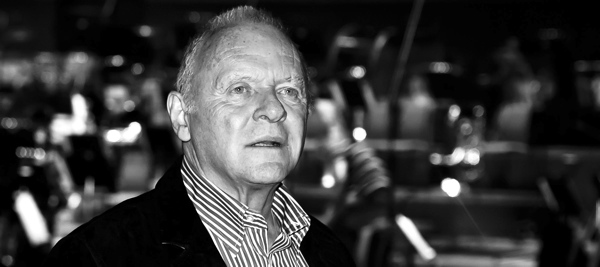
Anthony Hopkins, composer, at Birmingham Symphony Hall PHOTO: Julie Edwards
By Ray Bennett
In an evening of film scores played impeccably by the City of Birmingham Symphony Orchestra, Howard Shore’s theme from “The Silence of the Lambs” caused shivers and every attempt was made to warn that Hannibal Lecter was in the house.
But when the orchestra played an energetic number that reflected his childhood memories, the jolly Welshman on the far right of the stage emanated not a shred of menace. Jiggling delightedly to the music with his fractured right foot still in a cast, he was simply Anthony Hopkins, composer.
The Academy Award-winning film actor and knight of the stage told a packed and loudly enthusiastic audience in Birmingham’s splendid Symphony Hall on July 23 that he has written music since he was a child in Wales. Inspired by Elgar and Beethoven, he took music lessons, but he recalled that when his impatient baker father heard him play Beethoven’s “Pathetique”, he grumbled, “No wonder he went bloody deaf”.
Attracted to dissonant chords, the young Hopkins responded to the sounds in his head and began to improvise pieces. That continued over the years as his acting career grew and when his wife Stella urged him to take it seriously, he began to set down compositions.
When he directed his second film, “August” in 1996, he asked British composer George Fenton, who attended the Birmingham concert, to write the score because he admired greatly the music Fenton had written for Richard Attenborough’s 1993 picture “Shadowlands”, in which the actor had starred. Fenton was tied up with other commitments but he urged Hopkins to play some of the pieces he’d written, and he promised to help.
“Some months later,” Hopkins wrote in the CBSO Film Music Festival programme, “in George’s studio, 2:30 one wet, drizzling Friday morning, I completed the final piece of music for my film.”
He gave it the same title as his film, but in concert he changed it to “Margam”, named for the place where he grew up. It was, he wrote in his programme notes, “ … like an Eden of fields, farms and meadows of wild flowers, trees and woods in the Brombil valley, the Ranalt stream rippling down from the hill near Wern farm and onwards across the moors to the beach at Morfa Mawr and the sea”.
The piano of Stephen Barton, who prepared all of Hopkins’ music for the concert, and the trumpet of Jonathan Holland were featured in the evocative selection as Michael Seal conducted the orchestra in one of the evening’s highlights.
There were many highlights, however, with presenter Tommy Pearson, who was adviser on the film music festival with the CBSO, as an informative and witty guide. Fenton’s elegiac “Shadowlands” score was among them and composer Alex Heffes also was on hand to hear some of his spooky music from “The Rite”.
Elliot Goldenthal contributed a specially prepared suite from his imperious “Titus” score, and Patrick Doyle did the same with some typically melodic and rousing excerpts from his score for “Thor”. Richard Robbins’ atmospheric score for “Remains of the Day” also was included.
Hopkins’ own music proved to be a revelation, both wide-ranging and accomplished. The concert began with the discordant and percussive “Orpheus”, which Hopkins said he was inspired to write after seeing a play about Orpheus’ descent into the underworld. His wife inspired the elegant and romantic “Stella”, he said, and the pastoral “Evesham Fair” recalled the first carnival he visited as a boy.
A vibrant and colourful selection titled “Amerika” reflected the vivid and impressive images of the composer’s adoptive country that he saw as a child. To close the concert, three selections banded together with the title “1947” also reflected that time with “Circus” his impression of his first time under the Big Top and “Bracken Road” about a fleeting memory of hearing orchestral music from an open kitchen window on his way to the fields.
Finally, and as the encore, came the Latin-flavoured “Plaza”, named for the cinema where he used to “go to the pictures” and first saw the great MGM musicals. The piece was called “Schizoid Salsa” when it appeared on the soundtrack of “Slipstream”, which Hopkins directed in 2007.
That’s what had an obviously very happy Hopkins almost dancing at the end of the show. To tumultuous applause, he praised and thanked Seal and the orchestra. “I can’t say enough, it’s like a dream,” he said. “A dream that’s finally come true.”
CBSO Film Music Festival
The annual festival, with Tommy Pearson as adviser, kicked off on July 19 with a concert of 21st century soundtracks with the excellent Belgian conductor Dirk Brossé, music director of the Filmfestival, Ghent. The National Jazz Youth Orchestra presented an evening of Jazz in Film on July 21 and Michael Seal conducted the CBSO in a programme of John Williams Blockbusters on July 22.
Read more about the City of Birmingham Symphony Orchestra. More about Filmfestival Ghent. Photo of Anthony Hopkins in Birmingham’s Symphony Hall by Julie Edwards.

Pingback: Norman’s News, 7/28/11 | WCNY Blogs